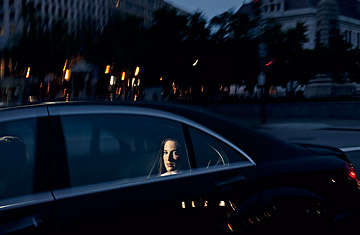
Sweet Ride. Uber D.C.'s Rachel Holt in one of her company's digitally dispatched luxury sedans. Some riders use them to get groceries.
(5 of 6)
You can often see the maldistribution of Washington's riches block by block--even on the same block, row house by row house--as young, well-to-do high achievers move into neighborhoods that real estate agents label hot, buying up properties, planting flower boxes and tending little squares of lawn behind wrought-iron fences, next to an abandoned building or a vacant lot or a home where a fatherless family is just scraping by. Most ber-Washingtonians say they like the urban grit. The crime and decay amid the plenty, says local activist Danny Harris, "are the price you pay if you want to live in an urban environment." The disequilibrium especially bothers Harris, he says, when it signals a civic detachment among his fellow young strivers. "You can have people who know every nuance of our policy toward Burma," he says, "but they don't know the name of the public school down the block."
Greener than Thou
Socially and culturally, life in ber-Washington can seem as insular as its economy, and the insularity has consequences for the rest of the country. ber-Washingtonians, for instance, are intensely concerned about the environment. The local economy bristles with company names like GreenBrilliance and SkyBuilt Power. But the unreal character of that economy makes it easy for Washingtonians to overestimate the ability or the desire of their fellow Americans to live as they do. In ber-Washington, the private automobile is looked on as at best a necessary nuisance and at worst a morally suspect source of sprawl and climate change. Many Washingtonians are eager to tell you they don't own one, preferring a highly subsidized commute on the Metro system's carpeted (if often unreliable) subway cars. Even Uber, the limo service, has been hailed on blogs as a green innovation, notwithstanding its emanations of conspicuous consumption. Bike-share racks have sprung up downtown and in the close-in suburbs to take advantage of the newly painted bike lanes that have squeezed grand thoroughfares like 14th Street down to two lanes. Local authorities have reserved hundreds of parking spaces exclusively for Zipcars, which customers rent for an hour or a day in place of buying a car of their own. The Zipcar motto: "Cars with a conscience."
No doubt the conscience thrives as much in Youngstown, Ohio, as it does in Washington, but you don't see many locals there trading their minivans for Zipcars or rent-a-bikes. Fracking for natural gas is regulated from Washington, where it is viewed with suspicion; in Pennsylvania and North Dakota, it is a source of potential riches and a better life. The sight of an oil platform may lift the heart of a worker struggling on the Gulf Coast; ber-Washingtonians have a different impression. In D.C., if in few other places, half a billion dollars lost to a solar company like Solyndra can seem to be the price of being conscientious. At the same time, life in Washington is so comfortable that it is easy for those living there to imagine that the rest of the country is doing just fine too. Aren't restaurants in your hometown packed at 10 p.m. on a Monday? No? Really?
No End in Sight
How long can such a culture of complacency last, even one as heavily subsidized by a country as rich as the U.S., in the face of awesome government debt?
